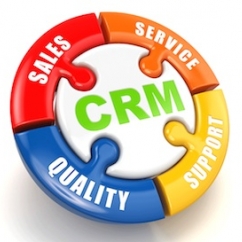Articles and News
A CRM System Helps Manage Your Customer Relationships To Better Sales | August 26, 2015 (0 comments)

Merrick, NY—CRM. For some better jewelers, those three letters and the processes and information around it have become second nature. For others, they remain a task-not-yet-started or a project stalled along the way.
CRM stands for Customer Relationship Management. Generally it involves tracking relevant data, generally with technology. While that seems a simple enough task, it also means depending on your sales staff to input the data as new customers come on board and existing customers make more sales.
Your company may be moving along just fine without a CRM system in place, but you are likely missing some opportunities. Is your sales staff following up for birthdays and anniversaries? And if they wanted to, does that information exist somewhere in your system and could they access it? What if you were having a special trunk show on short notice and wanted to invite everyone? Would you have their email addresses handy?
Or maybe customers come in, make a purchase, connect with a sales person and leave happy and then never hear from your company again! Or you want to implement a rewards program but don’t have the basic data. There are a hundred other scenarios, all ending in a much-needed data stream.
There are programs and companies that exist just to manage your data and even workable do-it-yourself options. Let’s check out the parameters, in case you think you might be missing some sales.
What is the data your CRM system needs? Customer name and full contact information, and preferred method of contact. Purchase date and sales information. Important dates. Wish list. Follow up date and preferred sales person. You’ll have data relevant to your store to include here with this short list. You get the idea.
Your sales people need to track this data, and in a format that’s readable and actionable. You may not have every piece of data for every person, but whatever you have is better than nothing (and you should shoot for every piece of data when possible). They need an easy way to keep track, such as entering it into a CRM system or even into a spreadsheet.
Then you need a follow-up system, using the customer’s preferred method of contact. Perhaps for an engagement ring purchase, it’s an immediate follow-up with a thank you and a wedding band conversion. For a long time customer, it’s a birthday call to her significant other and an anniversary inquiry. For a fashionable female self-purchaser, it’s a call when her favorite designer’s merchandise comes in. The system should be set-up to trigger these reminders and alert the correct salesperson. CRM systems can have a broader appeal as well – they can help your store offer amazing customer service through targeted contact and follow-ups.
So, you’ve got customer data + salesperson input + a follow-up plan = your CRM system. If you’re not keeping and using this data, take the time to re-think how this could bring in more sales, keep your sales staff on their toes and help your bottom line.
Top image: MPAssociates.com







